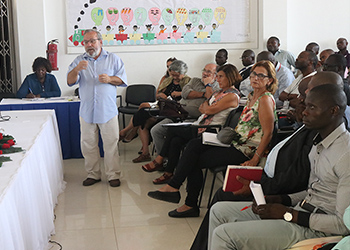Learning for all in Angola

The numbers say practically everything about this project unparalleled in the history of education in Angola. Around 630,000 primary school students are to benefit from a program investing in the continuous training of 15,000 teachers from every province.
Fostering an improvement in the quality of teaching and learning constitutes the core idea behind this initiative set up under the auspices of the Learning for All fund of the World Bank and managed by the Calouste Gulbenkian Foundation under the Portuguese acronym “PAT – Learning for All Project”. PAT deploys the cascade training method beginning with educational staff at teacher training colleges and ending with 15,000 primary school teachers and in turn spanning the approximate 630,000 students across the country.
PAT also incorporates the production of manuals and working files and records for teachers, student materials and pedagogical kits. This project is undergoing implementation in partnership with the Ministry of Education of Angola and counts on technical support from the Higher School of Education at the Polytechnic Institute of Setúbal. Nelson Matias is one of the coordinators of the project technical support team and considers that PAT provides “an enormous challenge to the Ministry of Education of Angola, which, for the first time, is undertaking a complex project, with various components, including continuous training for teachers”.
In addition to coordinating the various levels – geographic, competences of the trainers and trainees, subjects, training and training supervision –, Nelson Matias recalls the need to stage actions simultaneously across every province in the country and hence involving the travel of trainers and professors. Despite this complexity, the coordinator has no doubts about emphasising “a very good level of reception and involvement of all recipients, enabling and encouraging the acquisition of knowledge, exchanges of experiences and contacts in close proximity to the different educational and professional realities existing across the country”.
An empowerment project
Training in the service of primary school teachers represents one of the country’s greatest challenges as the director of the National Institute of Staff Training at the Ministry of Education said in a written statement. Luísa Grilo added that primary teaching “is the level worst served in terms of teachers, who have their profiles misaligned with the functions they perform, frequently not having any formal pedagogical preparation”. Hence, this project seeks to respond to the largest concern of the ministry, empowering teachers so that “they are able to teach the primary curriculum from the first to the sixth class, with greater capacities from the methodological and scientific point of view in the subjects of Portuguese Language and Mathematics”, the director added.
The feedback already received from the field and from ZIPs – the Zones of Pedagogical Influence proves it. Rosa Miguel, one of the ZIP coordinators in the zone of Ingombotas (Luanda) said that “the change was almost automatic”. The two phases of training enabled the teachers to learn new and differentiated ways of working that “led to an improvement in the performance and working practices of school directors”. And the coordinator added that the teachers began applying new methodologies and new ways of working, specifying that the evaluation carried out after the training sessions demonstrated the existence of “differentiated classes, the development of projects and interdisciplinary working, not considered before PAT”.
The project is advancing at a good pace and Luísa Grilo identifies two advantages from its implementation: the correction of shortcomings in the teaching-learning process and improvements in school management. Luísa Grilo explained how “the model introduced is to help the directors to democratise their schools, involving all of the community and sharing responsibilities between school and the surrounding environment and especially parents and guardians”.
